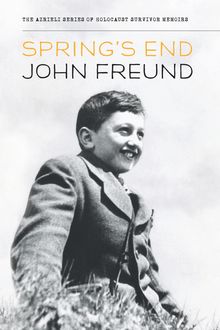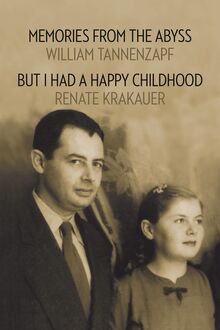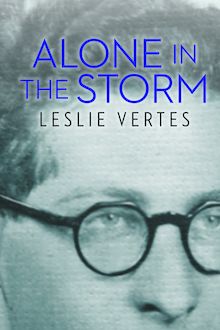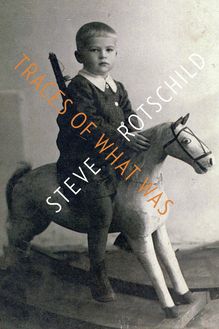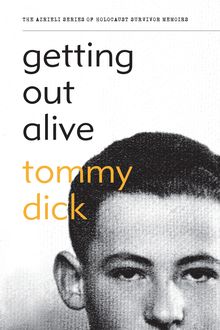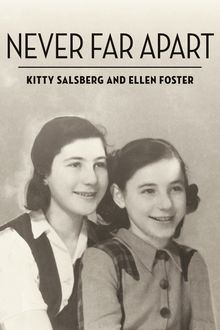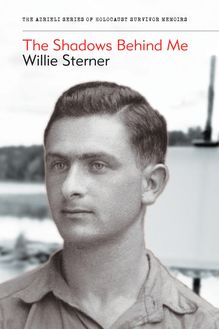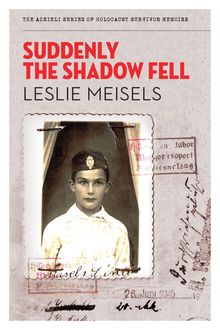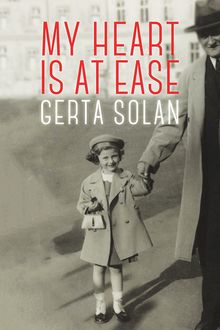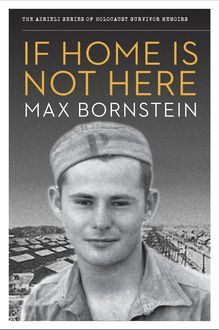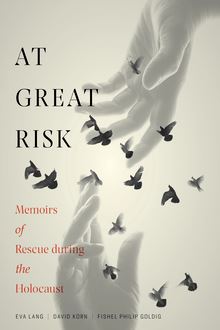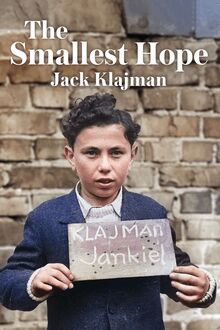Across the Rivers of Memory , livre ebook
121
pages
English
Ebooks
2015
Vous pourrez modifier la taille du texte de cet ouvrage
Obtenez un accès à la bibliothèque pour le consulter en ligne En savoir plus
Découvre YouScribe et accède à tout notre catalogue !
Découvre YouScribe et accède à tout notre catalogue !
121
pages
English
Ebooks
2015
Vous pourrez modifier la taille du texte de cet ouvrage
Obtenez un accès à la bibliothèque pour le consulter en ligne En savoir plus
Publié par
Date de parution
01 septembre 2015
Nombre de lectures
4
EAN13
9781897470978
Langue
English
Ten-year-old Felicia Steigman is confused by the sudden disruption to her life when she is expelled from school and forced to wear a yellow star. But she is completely unprepared for what happens next – the forced abandonment of her home and a gruelling journey, overseen by cruel Romanian Nazi collaborators, to Transnistria, a squalid place that doesn’t even exist on a map. Surviving three years surrounded by devastation and death, Felicia’s innocence disappears. When her family’s suffering is silenced and dismissed, Felicia boldly confronts the past, speaking out against injustice and commemorating the forgotten killing fields of Transnistria.
Across the Rivers of Memory
Felicia (Steigman) Carmelly
The Azrieli Series of Holocaust Survivor Memoirs
Naomi Azrieli, Publisher
Jody Spiegel, Program Director
Arielle Berger, Managing Editor
Elizabeth Lasserre, Senior Editor, French-Language Editions
Farla Klaiman, Editor
Elin Beaumont, Senior Educational Outreach and Events Coordinator
Catherine Person, Educational Outreach and Events Coordinator, Quebec and French Canada
Marc-Olivier Cloutier, Educational Outreach and Events Assistant, Quebec and French Canada
Tim MacKay, Digital Platform Manager
Elizabeth Banks, Digital Asset and Archive Curator
Susan Roitman, Office Manager (Toronto)
Mary Mellas, Executive Assistant and Human Resources (Montreal)
Mark Goldstein, Art Director
François Blanc, Cartographer
Bruno Paradis, Layout, French-language editions
Contents
The Azrieli Series of Holocaust Survivor Memoirs
Series Preface: In their own words...
About the Glossary
Introduction
Acknowledgements
Dedication
Foreword
Author’s Preface
Generations
An Only Child
The Nightmare
Death Surrounded Us
The Trek Back Home
Leaving Romania
Independence
Shattered! 50 Years of Silence
The Visual History of the Shoah
Journeys
Epilogue
Glossary
Photographs
Copyright
About the Azrieli Foundation
Also Available
Series Preface: In their own words...
In telling these stories, the writers have liberated themselves. For so many years we did not speak about it, even when we became free people living in a free society. Now, when at last we are writing about what happened to us in this dark period of history, knowing that our stories will be read and live on, it is possible for us to feel truly free. These unique historical documents put a face on what was lost, and allow readers to grasp the enormity of what happened to six million Jews – one story at a time.
David J. Azrieli, C.M., C.Q., M.Arch
Holocaust survivor and founder, The Azrieli Foundation
Since the end of World War II , over 30,000 Jewish Holocaust survivors have immigrated to Canada. Who they are, where they came from, what they experienced and how they built new lives for themselves and their families are important parts of our Canadian heritage. The Azrieli Foundation’s Holocaust Survivor Memoirs Program was established to preserve and share the memoirs written by those who survived the twentieth-century Nazi genocide of the Jews of Europe and later made their way to Canada. The program is guided by the conviction that each survivor of the Holocaust has a remarkable story to tell, and that such stories play an important role in education about tolerance and diversity.
Millions of individual stories are lost to us forever. By preserving the stories written by survivors and making them widely available to a broad audience, the Azrieli Foundation’s Holocaust Survivor Memoirs Program seeks to sustain the memory of all those who perished at the hands of hatred, abetted by indifference and apathy. The personal accounts of those who survived against all odds are as different as the people who wrote them, but all demonstrate the courage, strength, wit and luck that it took to prevail and survive in such terrible adversity. The memoirs are also moving tributes to people – strangers and friends – who risked their lives to help others, and who, through acts of kindness and decency in the darkest of moments, frequently helped the persecuted maintain faith in humanity and courage to endure. These accounts offer inspiration to all, as does the survivors’ desire to share their experiences so that new generations can learn from them.
The Holocaust Survivor Memoirs Program collects, archives and publishes these distinctive records and the print editions are available free of charge to educational institutions and Holocaust-education programs across Canada. They are also available for sale to the general public at bookstores. All revenues to the Azrieli Foundation from the sales of the Azrieli Series of Holocaust Survivor Memoirs go toward the publishing and educational work of the memoirs program.
•
The Azrieli Foundation would like to express appreciation to the following people for their invaluable efforts in producing this book: Doris Bergen, Sherry Dodson (Maracle Press), Barbara Kamieński, Therese Parent, and Margie Wolfe and Emma Rodgers of Second Story Press.
About the Glossary
The following memoir contains a number of terms, concepts and historical references that may be unfamiliar to the reader. For information on major organizations; significant historical events and people; geographical locations; religious and cultural terms; and foreign-language words and expressions that will help give context and background to the events described in the text, please see the Glossary .
Introduction
Felicia Carmelly’s life story hurls the reader into a tumultuous history and experience of places, societies and people of extraordinary variety. From beautiful Dorna, a town in southern Bukovina, to the deadly sites of Transnistria, to post-war Romania, then Israel and, finally, contemporary Canada, these pages illuminate a fascinating history and offer insight into myriad subjects. This history is palpable – alive with sounds, smells and colours, filled with details that even trained historians may find new.
At the same time, Across the Rivers of Memory is the testimony of a Holocaust survivor, and nothing makes that clearer than the author’s motivation to write it. Felicia Carmelly felt compelled to fill the gaps in her family history for her younger relatives and saw herself as responsible for keeping alive the memory of Jewish suffering in Transnistria. In doing the latter, Ms. Carmelly has gone far and beyond this memoir. As early as 1972, during a visit to Romania (as a Canadian citizen), she took the initiative to address officials from the Ministry of Education, expressing the need to teach the Holocaust in Romania’s secondary schools. In 1994, Felicia Carmelly founded the Transnistria Survivors’ Association in Canada and became its president. Between 1995 and 1997 she worked on a monumental project – a publication entitled Shattered! 50 Years of Silence: History and Voices of the Tragedy in Romania and Transnistria. The volume includes a detailed history of Transnistria, together with some official documents of the era and personal testimonies of Holocaust survivors. Felicia reflects on the uncanny feeling she had that producing this anthology, which sought to bear witness and expose the horrors of Transnistria to the world at large, was, in fact, the meaning of her life and the purpose of her survival.
It is only in the past few decades that the Holocaust in Eastern Europe has become a subject of intense scrutiny, and earlier societal reactions to the Holocaust underline the complex political considerations behind its silencing. Initially, as in other post-war European countries, gentiles’ fears of punishment for complicity in crimes, as well as competing victimhoods, were among the reasons for the overwhelming silence about the Holocaust. States, in their effort to consolidate societies torn apart by war, instead built legitimacy through narratives of national heroism and martyrdom; they were not keen to complicate these unambiguous histories with accounts that focused specifically on the destruction of Jewish communities.
This avoidance, accompanied by the failure of post-war East European regimes to officially recognize the extent of Jewish suffering, inflicted serious emotional pain on Holocaust survivors. As Felicia notes in her memoir, the particular handling of the history of the Holocaust by the Romanian and Soviet regimes after World War II was “the ultimate betrayal.” Yet, even after the fall of communism this situation did not show signs of rapid improvement. During the 1990s most of Eastern Europe, Romania included, went through an acute phase of nationalism, marked by a staunch refusal to admit the criminal behaviour of pre-war and World War II regimes. Sometimes, this included blunt Holocaust denial and accusations that Jews themselves attracted the murderous brunt of their country’s authorities. 1 For example, after 1989, Ion Antonescu – the Romanian dictator responsible for the destruction of over 250,000 Jews – was acclaimed as a national hero by the Romanian public, as the one who fought the Soviet Union to liberate Bessarabia. It was not until 2005, after an international outcry caused by the president of Romania’s Holocaust denial, that Romania created a committee to document crimes committed by Romanian authorities during the war, officially recognizing its responsibility in perpetrating the Holocaust.
•
Felicia (née Steigman) Carmelly was born in 1931 in the town of Vatra Dornei (Dorna), Bukovina, which was part of eastern Romania at the time. She was the only daughter of Laura (Lipzia) and Isaac (Yitzhak) Steigman, both natives of Dorna. The family’s cultural and political references were shaped by the particularities of the Bukovinian milieu. Historically part of the Principality of Moldavia, the territory of Bukovina was annexed by the Habsburg Monarchy after the 1775 partition of the Principality of Moldavia between the Austrian and Ottoman Empires. During the nineteenth century, the Austrian Empire introduced policies that encouraged an influx of numerous immigrants, aiming to boost the region’s economy. Among the newcomers were many Germans, Poles, Jews, Hungarians, Ukrainians and Romanians.
During the subsequent century, Habsburg Bukovina became known as “the most multinational crown-land.” The Jews in the Habsburg Empire appreciated the regime’s toleration of all nationalities and its commi
